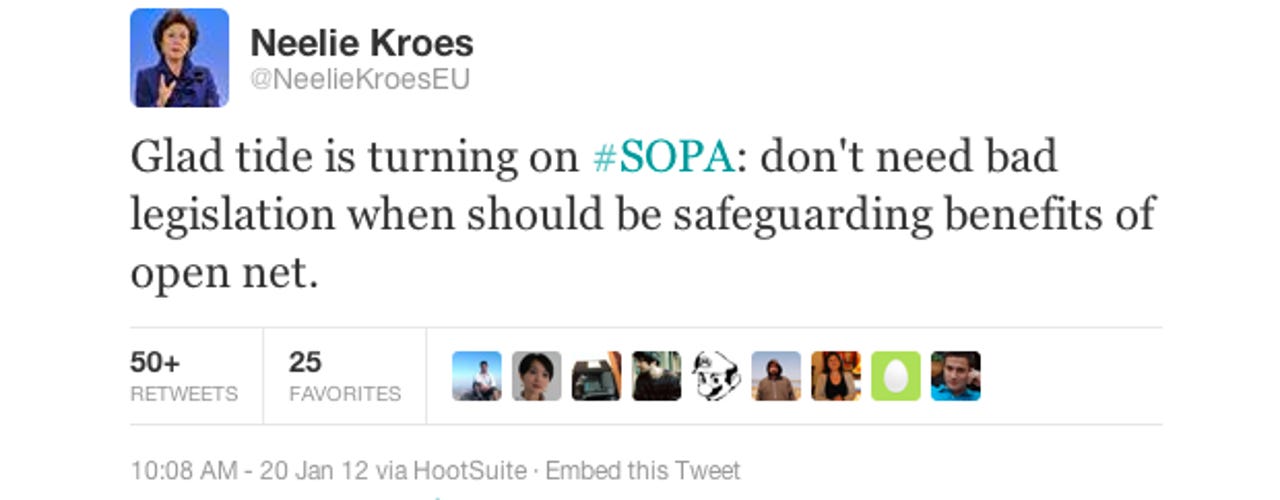Europe's digital agenda chief backs anti-SOPA protests

Europe's digital agenda chief Neelie Kroes tweeted her support for the anti-SOPA protests that went ahead this week.
The European Commission's vice-president for the digital agenda said that she is "glad [the] tide is turning on SOPA", while highlighting Europe's intentions to safeguard an open Internet.

The "tide" certainly came in this week -- and at some speed -- as over 75,000 websites went dark in protest of the controversial anti-piracy bills. Wikipedia, Google, and news-sharing site Reddit spearheaded 'Black Wednesday', and others were encouraged to pull the plugs on their sites for a day to show how the Web could look should the bills be introduced.
While the Stop Online Piracy Act (SOPA) was shelved this week, along with its Senate counterpart, the PROTECT-IP Act, also known as PIPA, it does not mean that the bills are dead, however.
Kroes highlighted the international 'piracy problem', but was cautious in her approach as to how to deal with it. She likened piracy to like speeding, in that both are illegal but: "you don't put speed bumps on the motorway", she said in a second tweet.
Kroes has been highly critical of governments' attempts to deal with piracy, including the copyright system itself. Speaking late last year, she said that it is not only a waste of money, but that the rights holders themselves for not embracing the new technological ways of distributing artistic works.
While both the European Parliament and the European Commission, the executive body of its 27 member state governments, will not impose SOPA-like legislation, many European countries are nevertheless introducing their own respective laws to counter the piracy endemic in their region.
Image source: Twitter, Twitter.
Related:
- Between the Lines: SOPA, PIPA postponed: Nice work, everyone
- David Gewirtz: 5 reasons why SOPA, PIPA and other legislative idiocy will never die
- Gallery: Black Wednesday: The day the Web went dark
- European Parliament ‘opposes’ SOPA copyright law in new resolution
- Geeks 1, Congress 0: Controversial anti-piracy bill SOPA ’shelved’
- Unless Facebook, Google blackout, SOPA will succeed: Here’s what you can do
- Reddit will enact ‘nuclear option’ to protest SOPA, PIPA
- Reddit’s anti-SOPA “nuclear” protest is a good start
- SOPA: Why the ‘broken web’ should stay broken
- Google, Amazon, Twitter and Facebook consider ‘nuclear’ blackout
- Go Daddy really and truly opposes SOPA now
- ZDNet Government: Dear Congress, guess what? We already have copyright laws
- London Calling: U.S. ‘threatened to blacklist Spain’ over SOPA-style law
- CNET: DNS provision pulled from SOPA, victory for opponents
- How SOPA would affect you: FAQ